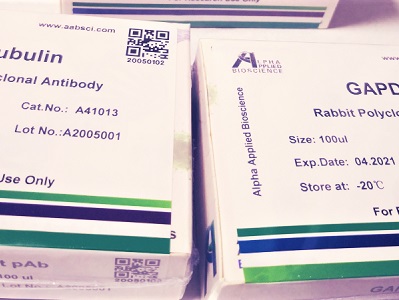

CA IX mouse mAb(12F10)
Cat :A11434
-
Source
Mouse
-
Applications
IF,WB,IHC,IP
-
Reactivity
Human
-
Dilution
IF: 1:50-200 WB: 1:3000 IP:1:200 IHC 1:50-300
-
Storage
-20°C/1 year
-
Specificity
The antibody detects endogenous CA IX proteins.
-
Source/Purification
The antibody was affinity-purified from mouse ascites by affinity-chromatography using specific immunogen.
-
Immunogen
Synthetic Peptide of CA IX
-
Uniprot No
Q16790
-
Alternative names
CA9; G250; MN; Carbonic anhydrase 9; Carbonate dehydratase IX; Carbonic anhydrase IX; CA-IX; CAIX; Membrane antigen MN; P54/58N; Renal cell carcinoma-associated antigen G250; RCC-associated antigen G250; pMW1
-
Form
PBS, pH 7.4, containing 0.5%BSA, 0.02% sodium azide as Preservative and 50% Glycerol.
-
Clonality
Monoclonal
-
Isotype
IgG
-
Background
carbonic anhydrase 9(CA9) Homo sapiens Carbonic anhydrases (CAs) are a large family of zinc metalloenzymes that catalyze the reversible hydration of carbon dioxide. They participate in a variety of biological processes, including respiration, calcification, acid-base balance, bone resorption, and the formation of aqueous humor, cerebrospinal fluid, saliva, and gastric acid. They show extensive diversity in tissue distribution and in their subcellular localization. CA IX is a transmembrane protein and is one of only two tumor-associated carbonic anhydrase isoenzymes known. It is expressed in all clear-cell renal cell carcinoma, but is not detected in normal kidney or most other normal tissues. It may be involved in cell proliferation and transformation. This gene was mapped to 17q21.2 by fluorescence in situ hybridization, however, radiation hybrid mapping localized it to 9p13-p12. [provided by RefSeq, Jun 2014],
-
Other
CA9, Carbonic anhydrase 9; Membrane antigen MN; P54/58N; Renal cell carcinoma-associated antigen G250; RCC-associated antigen G250; pMW1
-
Mol.Wt (Da)
49698
-
Concentration
1 mg/ml
| Product | Reactivity | Applications | Conjugation | Catalog | Images |
|---|
-
 400-836-3211
400-836-3211
-
 support@aabsci.com
support@aabsci.com
-
β-actin rabbit pAb ...... >
-
β-actin rabbit pAb(A284) ...... >
-
Plant-actin rabbit pAb ...... >
-
β-tubulin mouse mAb(M7) ...... >
-
GAPDH mouse mAb(2B8) ...... >
-
GAPDH mouse mAb(PT0325) ...... >
-
Histone H3 rabbit pAb ...... >
-
Histone H3 rabbit pAb ...... >
-
COX IV mouse mAb(6C8) ...... >
-
GFP-Tag mouse mAb(1G6) ...... >
-
HA-Tag mouse mAb(1B10) ...... >
-
mCherry-Tag mouse mAb(6B3) ...... >










 400-836-3211
400-836-3211
